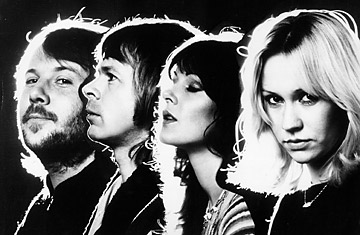
Abba is inducted into the Rock and Roll Hall of Fame on March 15, 2010
I can't define rock 'n' roll. I can tell you when it started, and I understand how it evolved. I can name-check offshoots and side genres (soul, punk, new wave, grunge, heavy metal, hardcore, thrashcore, punkcore, corepunk, crapcore — some of these may be made up) to prove the depth of my musical knowledge. I know that rock 'n' roll involves a bass, drums and a guitar, except for sometimes when it doesn't. Sometimes there's a keyboard. Sometimes there isn't. If I had to provide only one example — if I had to offer one song that defines what rock 'n' roll means to me — I'd go with Elvis Presley's "Jailhouse Rock." After that, probably something by the Beatles.
I would not choose Abba.
The Swedish pop group's March 15 induction into the Rock and Roll Hall of Fame and Museum seems weird and unnecessary, as do some of the previous years' additions: Madonna, Joni Mitchell, Run-DMC, James Taylor, Michael Jackson and the Bee Gees. Yes, these are all talented artists. I grew up listening to Michael Jackson; Joni Mitchell appears frequently on my iPod's playlists; and "Stayin' Alive's" opening line, "You can tell by the way I use my walk I'm a woman's man, no time to talk" is probably the most badass use of falsetto I've ever heard. That's some great music. But it's not rock 'n' roll.
Abba co-founder Benny Andersson seems to feel the same way. "I didn't think this would happen," he told Rolling Stone back in December, after the 2010 nominees were announced. "We were a pop band, not a rock band."
Abba became famous after winning the 1974 Eurovision contest with the song "Waterloo," which the band performed while wearing brightly colored outfits made mostly of satin. Over the next eight years, it would have a seemingly endless stream of hit singles, 10 of which would break the Top 20 in the U.S. Abba hasn't performed together since 1982, but thanks to the hit Broadway show and movie Mamma Mia!, its continued popularity has made it one of the best-selling groups in history. But those pantsuits! Those songs! Nominating Abba to the Rock and Roll Hall of Fame is sort of like saying the best dessert you've ever tasted was a Hostess cupcake.
Which brings us back to the problem of trying to define rock 'n' roll. Rock is the cooing on "Gimme Shelter", the dripping guitars on "Purple Haze", the riff that brings Pete Townshend's nimble strumming to new heights on "Pinball Wizard." It's Thom Yorke's nasal voice on "Paranoid Android" and the way Nirvana somehow managed to sound loud and muffled at the same time. But is it the saccharine harmonies of Abba's "Dancing Queen"? Pudgy dudes in Led Zeppelin T shirts would probably say no, but the 30 music historians, journalists and industry executives who make up the Rock and Roll Hall of Fame's nomination board say yes.
"Our definition of rock 'n' roll is very broad," says Jim Henke, the Rock and Roll Hall of Fame's vice president of exhibitions. "It's not just skinny white guys who play guitar." Henke argues that in the context of the museum, rock 'n' roll isn't just a sound; it's a culture. That culture extends from doo-wop harmonies and dance routines to people who bite the heads off bats. And somewhere within that culture is a Swedish pop group that has sold nearly 400 million albums.
This year, Abba will be inducted along with Genesis (prog rock), Jimmy Cliff (reggae), the Hollies (British Invasion rock) and the Stooges (punk). "This is the perfect class of inductees," says Henke. "Rock 'n' roll has developed into all those subgenres. They're all related." As a rule, an artist's career must have started at least 25 years ago for Hall nomination. This avoids one-hit wonders and bands that drop off the music map after one or two albums. (Remember Bush?) But no matter who is picked, every year there's at least one inductee who inspires complaints. "Very few people consider themselves art experts," says Henke. "But rock 'n' roll is a populist art form, and everyone has an opinion. One year we had a U2 exhibit, and people even complained about that."
Because of the 25-year rule, the Hall of Fame has not yet inducted any artist whose music career started after 1985. But soon the museum will encounter subgenre mania: contemporary rock music expanded exponentially in the '80s and '90s, shooting off one way into hip-hop, another way into alternative, still another into emo. With such a broad definition of rock 'n' roll, the museum may one day find itself struggling to fit acts like N.W.A. and Pavement into one induction ceremony. There really isn't one definition of what makes a song or band "rock" anymore. There is just music we like, songs that make us feel good. Those first few bars of "Jailhouse Rock" — those three slow ba-dum, ba-dums, followed by some of the best sing-shouting ever recorded — make that track one of the best songs I've ever heard. Every time it plays, I stop whatever I'm doing and listen.
But that's just me. I asked some friends and co-workers to define rock 'n' roll in one song. Here is what they came up with:
• "Chuck Berry's version of 'Johnny B. Goode.'"
• "'Bohemian Rhapsody.' "
• "'Black Betty' by Ram Jam."
• "Most versions of 'All Along the Watchtower,' except for [the versions by] U2 and Dave Matthews."
• "'Peggy Sue.'"
• The Allman Brothers' 'Whipping Post.'
• "The Beatles' 'I'm Down.'"
• "The Beatles' 'Happiness Is a Warm Gun.'"
• "The Beatles' 'Revolution.'"
• "Enya."
(That was my friend Molly. Ignore her; she's frequently wrong.)
